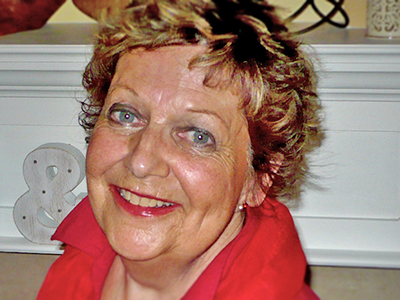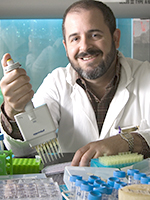
"I say yes to participating in research because hopefully it can do some good and help get knowledge out there to patients like me."
– Barbara Phillipson, North Vancouver
When North Vancouver resident Barbara Phillipson heard about fecal microbial therapy (FMT)—also known as a stool transplant—she couldn’t help but think it was a joke. But when she was introduced to the idea as a possible treatment for the challenging C. difficile infection (also known as C. diff) she’d been battling for a year, she decided to participate in a clinical study investigating the safety and efficacy of FMT and swore anyone she discussed it with to secrecy.
“Stool transplants aren’t something people are comfortable talking about,” says the 61-year old former pre-school supervisor. “After being re-infected with C. diff because of antibiotics and ending up in the hospital having to take them a number of times, I finally refused to take them. Then I learned about the FMT study through the hospital. Now, I sing the therapy’s praises.”

C. diff is a bacterial infection of the colon typically brought on by antibiotics. When an otherwise healthy individual ingests C. diff bacteria, they normally don’t get sick. But in Phillipson’s case, because she was taking antibiotics as part of her liver transplant process, her gut’s normal bacteria were depleted, which allowed C. diff to grow and produce toxins that damaged her intestinal lining and cause symptoms such as persistent bowel pain and diarrhea.
“Having C. diff is life altering—you can’t function, you can’t go anywhere, you can’t be far from a washroom at any time,” she says. “It only ever briefly clears up. It’s a very frustrating disease.” In some rare circumstances, C. diff can even lead to sepsis and be life-threatening.
Vancouver Coastal Health Research Institute scientist Dr. Ted Steiner says that while most patients respond well to standard treatment for C. diff, the infection returns in about 25 per cent of people and it is not yet known how best to treat patients who repeatedly relapse.

“There are a few antibiotics to treat C. diff and well-established guidelines that direct physicians on the best way to treat the condition, but we are still investigating how to treat the cases that don’t respond to these treatments.”
Dr. Steiner is the local principal investigator for the Canada-wide clinical study Phillipson participated in, which is investigating the safety and efficacy of FMT for treating recurrent C. diff. Study participants receive FMT, in which an enema containing donor stool is administered. Stool specimens are collected from healthy screened donors, prepared, frozen, and then thawed as needed for treatment.
“FMT has been shown to cure about 80 per cent of people with relapsing C. diff, but the best way to administer it and the ideal donors to use are unknown,” says Dr. Steiner.
Phillipson says the procedure was very simple and brief and she appreciated how easy it was to speak with Dr. Steiner about this potentially “embarrassing” process.
“That is a really important part of the process because you do go in with such apprehension. It’s an awkward situation,” she says. “But to be so well cared for by Dr. Steiner, that was a huge factor. I was very comfortable with him right away.”
Both Phillipson and Dr. Steiner hope to encourage people to conquer their own squeamishness when it comes to the topic of FMT, which is already approved by Health Canada as a form of treatment.
“Certainly I’ve had patients who really cannot accept the idea of a stool transplant. But I’ve also had many patients who were initially resistant, but after suffering as long as they had with C. diff, they were willing to do just about anything to treat the condition,” says Dr. Steiner
“It’s important to remember that we’re constantly exposed to other people’s bacteria—walking through the supermarket, taking public transit, handling items in your bathroom like for brushing your teeth—you’re being exposed to surfaces that are contaminated with other people’s stool,” he adds. “Your cell phone probably has more stool bacteria than your toilet seat. So, what we’re doing is something that’s not all that different than what people are routinely experiencing, but we’re doing it in a controlled way.”
“I think this study will help people be more comfortable with the procedure and will help us improve upon how to inform patients about its risks and benefits in treating C. diff.”
THIS IS ONE PATIENT’S STORY OF PARTICIPATING IN A CLINICAL TRIAL. YOUR EXPERIENCE MAY DIFFER. LEARN MORE ABOUT CLINICAL TRIALS BEFORE PARTICIPATING.


